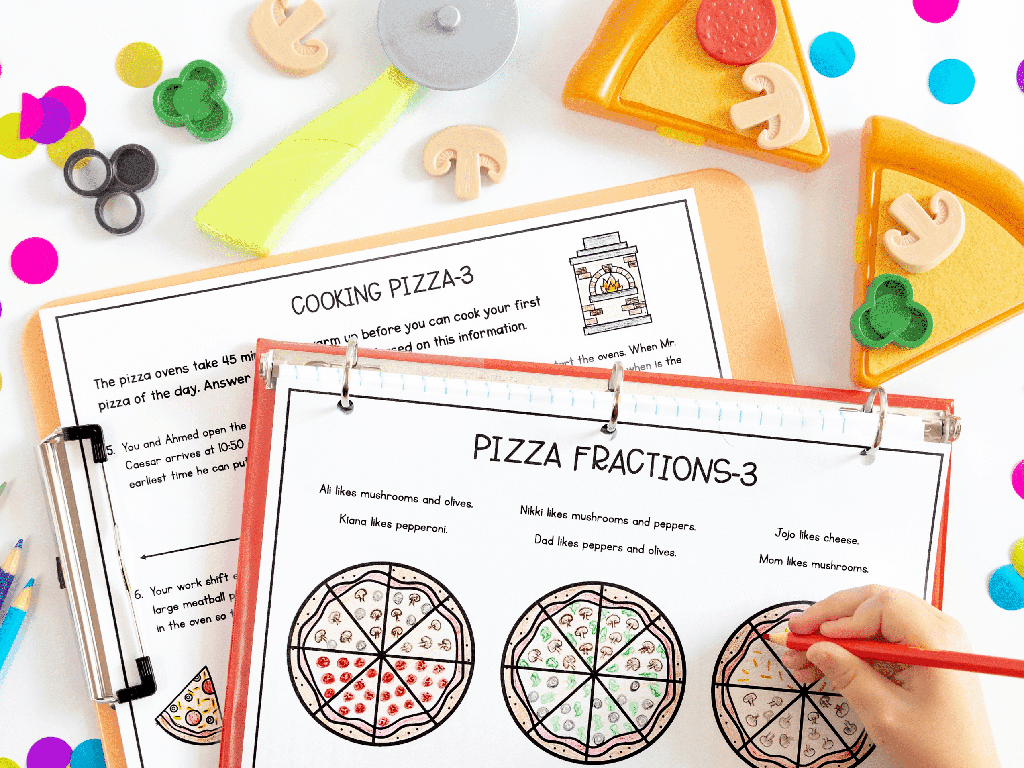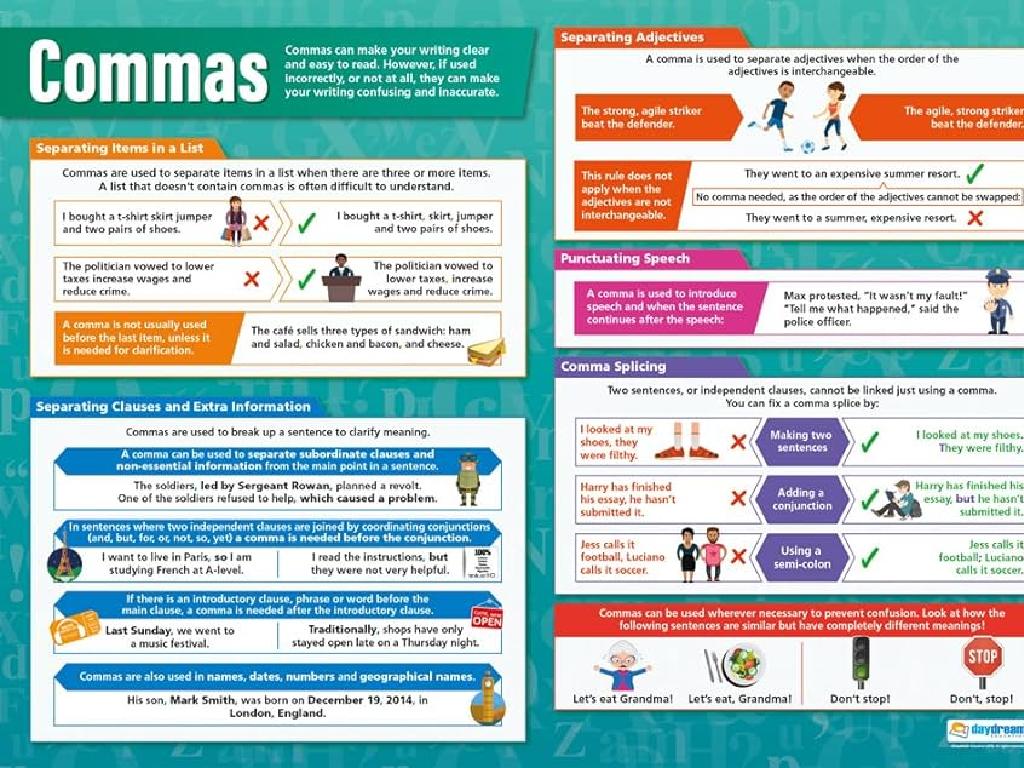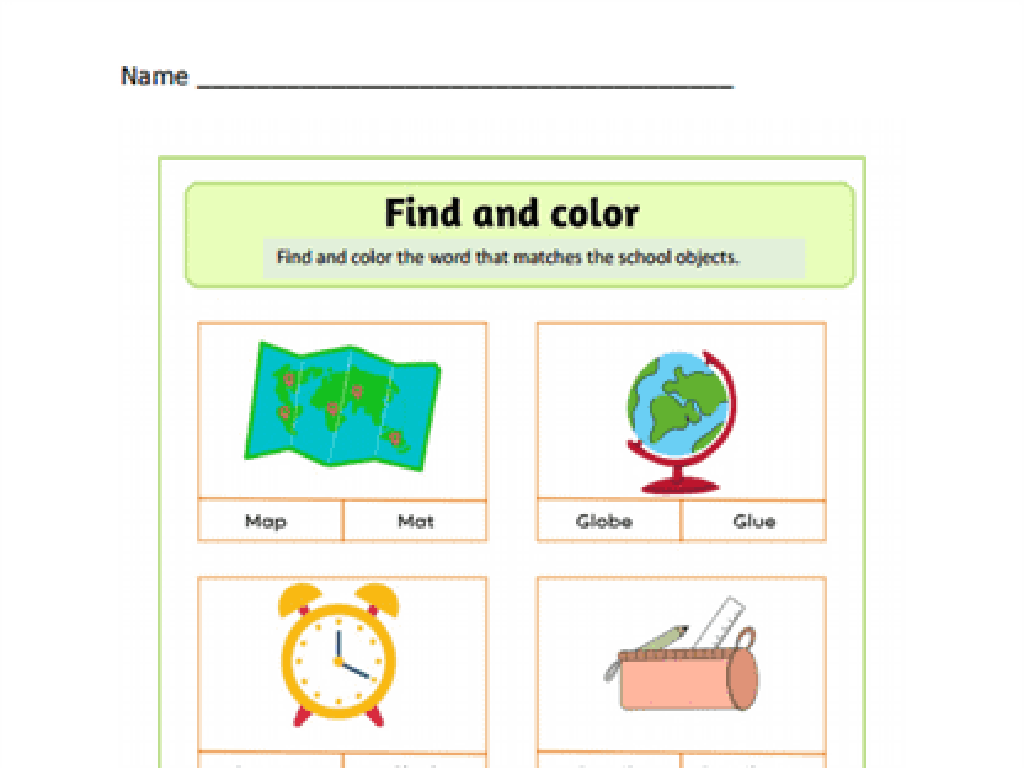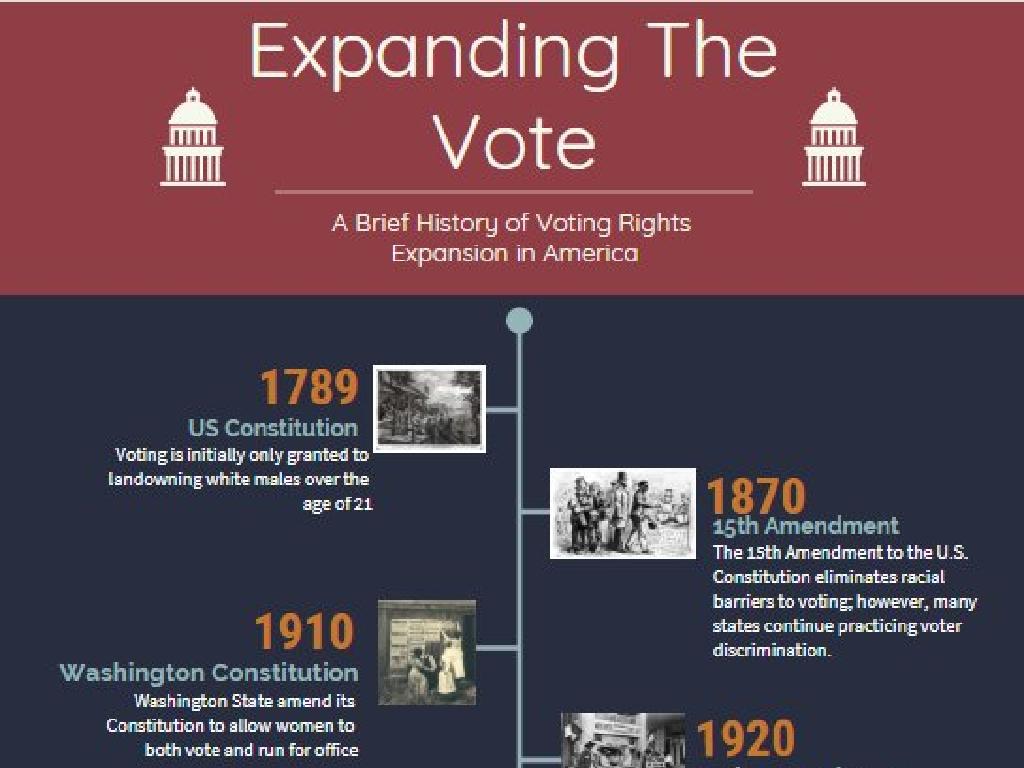Purposes Of Government
Subject: Social studies
Grade: Sixth grade
Topic: Government
Please LOG IN to download the presentation. Access is available to registered users only.
View More Content
Purposes of Government
– Government’s role in society
– Ensuring order and security
– Laws and law enforcement maintain peace
– Providing public services
– Governments offer education, healthcare, and infrastructure
– Protecting citizens’ rights
– Governments uphold laws that protect freedom and equality
|
This slide introduces the fundamental purposes of government, aiming to help students understand why governments are necessary in society. Discuss the government’s role in creating a structured and orderly environment where citizens can live safely. Highlight how governments provide essential services that individuals cannot efficiently provide for themselves, such as public education, healthcare, and transportation. Emphasize the importance of government in protecting the rights of its citizens, ensuring that all people have the opportunity to live without discrimination and with equal protection under the law. Engage students by asking them to think of ways the government impacts their daily lives and how different their lives might be without these structures in place.
Exploring the Purposes of Government
– Define government
– A system for creating and enforcing laws
– Roles government plays
– Provides services, ensures rights, and maintains order
– Various government forms
– Democracy, monarchy, dictatorship, and more
– Impact on society
– Governments shape economies, cultures, and daily life
|
This slide introduces the concept of government to sixth-grade social studies students. Begin with a clear definition of government as the organization that makes and enforces rules for a community or society. Discuss the roles of government, such as providing services like education and healthcare, ensuring the rights of citizens, and maintaining order through law enforcement. Explore different types of government, including democracy where citizens have a voice, monarchy with royal leadership, and dictatorship where power is held by a single leader. Emphasize how the type of government can significantly impact various aspects of society, including the economy, culture, and the everyday lives of its citizens. Encourage students to think about how different governments around the world and throughout history have shaped societies.
The Four Purposes of Government
– Maintain order and security
– Governments create laws to keep peace and safety.
– Protect from external threats
– Defending the nation against foreign adversaries.
– Promote the general welfare
– Ensuring citizens’ basic needs are met.
– Regulate economic activity
– Governments create policies to guide the economy.
|
This slide outlines the fundamental purposes of government, which are essential for maintaining a stable and functioning society. The first purpose is to maintain order and provide security; this is achieved through the establishment and enforcement of laws. The second purpose is to protect citizens from external threats, which includes national defense. The third purpose, promoting the general welfare, involves creating conditions that enhance the well-being of citizens, such as providing education and public health. Lastly, managing and regulating economic activity is crucial for a balanced and fair economy. These four purposes are the pillars upon which governments operate and serve their citizens. In class, discuss examples of each purpose and how they impact daily life. Encourage students to think of additional examples and to consider how these government roles affect their own community.
Maintaining Order: Government’s Role
– Governments ensure safety
– Stability through laws
– Law enforcement agencies
– Police and judicial systems uphold laws
– Example: Traffic regulations
– Traffic rules prevent accidents and manage flow
|
This slide focuses on how governments maintain order by ensuring safety and stability within a society. Discuss the importance of laws in establishing guidelines for behavior and how these laws must be followed to prevent chaos. Explain the role of law enforcement agencies, including the police and judicial systems, in upholding these laws. Use traffic rules as a tangible example that students can relate to, illustrating how such regulations prevent accidents and manage the orderly flow of vehicles. Emphasize that without such rules and the agencies to enforce them, there would be a higher risk of accidents and general disorder.
Purposes of Government: Protection from Threats
– National defense and military
– Protects the country from external threats
– Diplomacy and forming alliances
– Maintains peaceful relations and cooperation
– Example: Border security
– Guards against unauthorized crossings
|
This slide focuses on the government’s role in protecting its citizens from external threats. National defense involves maintaining armed forces, such as the army, navy, and air force, to safeguard the nation’s sovereignty. Diplomacy and alliances are about building relationships with other countries to promote mutual interests and peace. An example of protection is border security, which includes measures to prevent illegal immigration and smuggling. Discuss with students how these aspects contribute to their safety and the country’s stability. Encourage them to think about how these protective measures impact their daily lives and the importance of international cooperation for a secure world.
Promoting Welfare Through Government
– Government provides public services
– Like roads, libraries, and emergency services
– Focus on education, health, and safety
– Schools for learning, hospitals for health, police for safety
– Public schools as an example
– Funded by the government for all children
– Benefits of these services to society
|
This slide aims to explain how one of the purposes of government is to promote the welfare of its citizens by providing essential public services and benefits. Emphasize the role of government in ensuring access to education through public schools, maintaining public health with hospitals and healthcare programs, and safeguarding the community with police and fire services. Use public schools as a concrete example to show how the government invests in the education of every child, regardless of their background. Discuss how these services contribute to the overall well-being and stability of society. Encourage students to think about other public services they use and how these improve their daily lives.
Economic Regulation by Government
– Govt’s role in economy
– Govt. controls money flow, ensures fair trade
– Understanding taxes & budgets
– Taxes fund public services; budgets allocate spending
– Business regulations example
– E.g., setting safety standards for products
|
This slide aims to explain the role of government in regulating the economy, which includes managing economic activities to ensure stability and growth. The government imposes taxes to generate revenue, which is then allocated through budgets to various public services and sectors. An example of economic regulation is when the government sets business regulations, such as safety standards for products, to protect consumers and ensure fair practices. Discuss with students how these regulations impact their daily lives and the importance of these measures in maintaining a fair and functioning economy.
Why is Government Important?
– Engage in Think-Pair-Share
– Discuss necessity of government
– Why do societies form governments?
– Share insights with the class
– Each pair presents their ideas
– Reflect on government’s roles
– Consider protection, laws, services
|
This slide introduces a Think-Pair-Share activity to engage students in a discussion about the importance of government. Start by explaining the activity: students will first think individually about why we need government, then they will pair up with a classmate to discuss their thoughts, and finally, they will share their insights with the class. Encourage students to consider the various roles of government, such as providing protection, establishing laws, and offering services to citizens. This activity aims to foster critical thinking and public speaking skills, as well as deepen their understanding of the fundamental purposes of government in society.
Class Activity: Create Your Own Government
– Form groups for government design
– Decide your government type
– Will it be a democracy, monarchy, or something else?
– Outline your government’s purposes
– What will it do for its citizens? Think about laws, protection, and services.
– Prepare to present to the class
|
This activity encourages students to apply their knowledge of government types and purposes by creating their own for an imaginary country. Divide the class into small groups and assign each group the task of designing a government. They should decide on the type of government and its purposes, such as making and enforcing laws, protecting citizens, providing services, and ensuring rights. Each group will then present their government to the class, explaining their choices and how their government will function. This will help students understand the complexities of government and the thought process behind establishing one. Provide guidance and examples of different government types and purposes to help them get started. Encourage creativity and critical thinking.
Wrapping Up: Government’s Role & Homework
– Recap today’s government lesson
– Homework: Paragraph on government’s daily role
– Reflect on how government decisions impact everyday activities.
– Study for a quiz on government types
– Review different government forms and their functions.
– Understand government purposes
– Grasp why governments are necessary in society.
|
As we conclude today’s lesson on the purposes of government, students should be able to summarize what they’ve learned. For homework, they are tasked with writing a paragraph on how government plays a role in their daily lives, encouraging them to connect classroom knowledge with real-world examples. Additionally, students should prepare for an upcoming quiz by reviewing the types of government and their purposes, ensuring they understand the material covered in class. This will help solidify their comprehension of the subject matter and its relevance to their lives.






